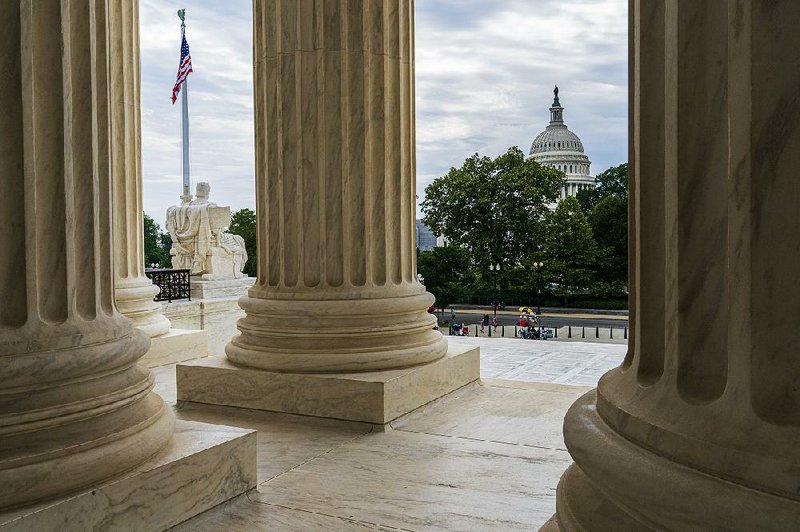A divided U.S. Supreme Court on Wednesday rejected calls by business groups to overturn two decades-old rulings that have given federal agencies broad power to interpret their own regulations. The justices also struck down as unconstitutional a Tennessee law that imposed residency requirements on people seeking to run liquor stores.
Voting 5-4 on the regulations case, the court on Wednesday reaffirmed rulings from 1945 and 1997 that typically require judges to defer to an agency on the meaning of ambiguous regulations. The court limited that legal doctrine, though, laying out new guidelines for when courts should yield to agencies.
Chief Justice John Roberts joined the court's liberal-leaning justices in the majority. Writing the court's lead opinion, Justice Elena Kagan rejected contentions that federal agencies have grown too powerful and that judges should have the primary responsibility for interpreting unclear regulations.
"It is no answer to the growth of agencies for courts to take over their expertise-based, policy-making functions," Kagan wrote for the court.
The ruling came as the justices near the end of their nine-month term. The court will issue its final opinions today and is expected to rule on partisan gerrymandering and the Trump administration's plan to ask about citizenship in the 2020 census.
Business groups said deference to agencies on the meaning of regulations leads to onerous and unpredictable rules and leaves companies vulnerable to penalties when an agency shifts its thinking. Trade groups representing the oil, mining, farming and manufacturing industries were among those urging the court to jettison the previous rulings.
Four conservative justices said the court should have scrapped the doctrine, known as "Auer deference" after the 1997 Auer v. Robbins ruling. Writing for the group, Justice Neil Gorsuch said Auer deference lets agencies avoid having to amend their regulations through formal notice-and-comment proceedings.
"With Auer, there is no fair hearing," Gorsuch wrote. "Whether purposeful or not, the agency's failure to write a clear regulation winds up increasing its power, allowing it to both write and interpret rules that bear the force of law."
Kagan said Auer deference should apply only when a regulation is "genuinely ambiguous," when an agency's interpretation is reasonable and when its approach stems from its "substantive expertise" and "fair and considered judgment."
"What emerges is a deference doctrine not quite so tame as some might hope, but not nearly so menacing as they might fear," she wrote.
Gorsuch said the majority opinion had rendered Auer a "paper tiger" and is likely to "force litigants and lower courts to jump through needless and perplexing new hoops."
Opponents of Auer deference offered mixed reactions.
"The Supreme Court missed an opportunity today to strike down an unconstitutional, judicially created doctrine that gives unaccountable bureaucrats the benefit of the doubt when deciding what their regulations do or do not require of small businesses and, indeed, all Americans," said Karen Harned, executive director of the National Federation of Independent Business's Small Business Legal Center.
The Justice Department declined to comment.
The issue came to the court in a nonbusiness context. James Kisor is a Vietnam War veteran who says he suffers from post-traumatic stress syndrome and is seeking retroactive benefits.
Kisor said the U.S. Department of Veterans Affairs should reconsider its denial of his 1982 claim for benefits because it didn't consider important evidence about his combat service. The case turned on a VA regulation that requires reconsideration if "relevant" service records come to the department's attention.
A federal appeals court, applying Auer deference, ruled against Kisor. The Supreme Court's ruling Wednesday told the lower court to reconsider whether deference was warranted.
In the Tennessee case, the court voted 7-2 in ruling that a state requirement that someone live in Tennessee for two years to be eligible for a license to sell liquor violates the Constitution.
The case pitted the authority given to states to regulate alcohol sales in the 21st Amendment that repealed Prohibition against the constitutional principle that only Congress, not the states, can regulate interstate commerce.
The law was challenged by a Utah couple, Doug and Mary Ketchum, who moved to Memphis in the hope that the weather there would be better for their disabled daughter, and by Total Wine, a national chain with nearly 200 liquor stores in 23 states. A federal appeals court struck down the two-year residency requirement, saying it violated the Constitution by discriminating against new residents. The Ketchums operate a Kimbrough Wines & Spirits in Memphis.
The law's defenders said it imposed reasonable restrictions, giving the state time to conduct background checks and investigations. They added that people with local roots were more likely to act responsibly.
Information for this article was contributed by Greg Stohr of Bloomberg News, by Robert Barnes and Ann E. Marimow of The Washington Post and by Mark Sherman of The Associated Press.
Business on 06/27/2019

